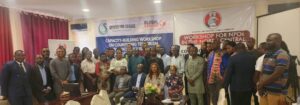Executives of over 140 local and international non-profit organizations (NPOs) operating in the North-East and North-Central regions of Nigeria participated in the capacity-building workshops on countering terrorism financing in the non-profit sector organized by Spaces for Change | S4C, in collaboration with the Economic and Financial Crimes Commission (EFCC), with support from the Global Center for Cooperative Security. The workshops held in Maiduguri (North-East Nigeria) and Abuja (North-Central) on November 15 & 16 and 22 & 23 respectively, targeted the directors, program managers, compliance officers, finance and administrative officers, and other relevant personnel of NPOs operating in the areas identified as being at risk of terrorism financing abuse.
The workshops formed part of a strategic alliance between S4C and the EFCC’s Special Control Unit against Money Laundering (SCUML) to broadly disseminate the findings of the terrorism financing risk assessment (TFRA) of the non-profit sector in Nigeria, and apprise NPOs about the new regulatory measures that have been introduced based on the assessment. SCUML conducted the TFRA between 2021-2022 in compliance with Recommendation 8 (R8) of the Financial Action Task Force (FATF)—a global regulatory body for combating money laundering and terrorism financing—which requires countries to identify the subset of NPOs vulnerable to terrorist financing (TF) risks and apply targeted and proportionate regulatory measures to those groups.
Among other things, the TFRA found that the subsets of NPOs—with the following features, types, activities, and characteristics—have higher vulnerability to TF abuse: Foreign NPOs active in the North-East | NPOs with links to high-risk foreign individuals or entities | NPOs active in very high-risk areas, including movement of goods (North-East and North-West) or Medium-Risk areas (South-East). Based upon these findings, SCUML rolled out new regulatory measures targeted at the at-risk NPOs, titled, Economic and Financial Crimes Commission (Special Control Unit Against Money Laundering Supervision of Non-Profit Organizations at Risk of Terrorism Financing Abuse) Regulation 2023 (NPO Regulation 2023), in May 2023.
First off, what does it mean to be at-risk of terrorism financing abuse? Facilitators clarified that this does not translate to an indictment. Being flagged as vulnerable to terrorism financing abuse does not imply that these NPOs are funding or are engaged in activities that support terrorism. Rather, it serves to draw attention to the potential risks inherent in their operations that could be easily exploited by terrorists in the absence of adequate risk mitigation strategies internally and externally.
Various presentations and practical sessions at the workshops shed light on the nature of terrorism financing risks in the NPO sector, the legal frameworks governing Nigeria’s war against terror and terrorism financing, various terrorism financing typologies and terminologies as well as risk mitigation strategies. They also learned about the methodology and findings of the TFRA, the criteria used for determining the ten subsets of NPOs vulnerable to terrorism financing abuse, taking into account their geographical proximity to regions where terrorist activities are widespread. The primary terrorist threats in Nigeria are Boko Haram and Islamic State’s West Africa Province (ISWAP), while the secondary threats include Yan Bindiga/Yan Taadda, international Islamic terrorist groups (like al-Qaida, ISIS, Al-Shabab), and domestic secessionist groups (including IPOB).
To strengthen internal measures against terrorism financing, the participants received practical guidance on how to conduct sanction screenings to identify designated terrorist groups and individuals. It is important to conduct sanction screenings before engaging vendors, prospective employees, board members, beneficiaries, etc., and to maintain records for inspection purposes. NPOs are required to file a suspicious transaction report to the Nigerian Financial Intelligence Unit (NFIU) within 24 hours in the event of encountering any person flagged on the sanction list.
Opening exercises at the beginning of the workshop showed that most NPOs are not familiar with the concept of terrorism financing. The workshops helped to bridge the knowledge gap among NPOs operating in regions where insurgent groups and terrorist sects operate. The close-out exercises showed significant improvements in participants’ understanding of terrorism financing concepts, sanction screenings, and compliance with the new NPO Regulations 2023. In the coming months, S4C and EFCC will take steps to ensure these outreaches reach NPOs operating in other parts of the country, whether identified to be at-risk or not.




